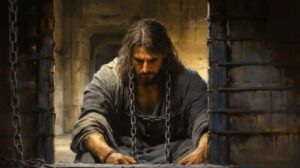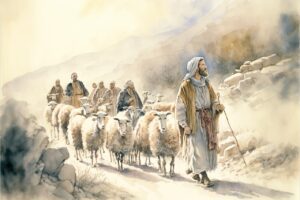filter posts:
Date
Author
Our God Will Do It
 Peter brings his first letter full circle at the end, reminding the elect exiles that their suffering is purposeful but temporary. “After you have suffered a little while,” he writes. Some of you might feel like your suffering has gone on for much more than a little while, and indeed there are people who suffer most or all of their lives with chronic illness. But the Bible tells us we are not victims of chance. We are not tossed about by the wind and waves of fate or cruel destiny. Instead, the God of all grace is for us, and he has called us to his eternal glory in Christ. And even though our suffering may last a lifetime, it is still a ‘little while’ compared to the eternal glory we have waiting for us. As the Puritans liked to say, “Affliction may be lasting, but it is not everlasting.”
Peter brings his first letter full circle at the end, reminding the elect exiles that their suffering is purposeful but temporary. “After you have suffered a little while,” he writes. Some of you might feel like your suffering has gone on for much more than a little while, and indeed there are people who suffer most or all of their lives with chronic illness. But the Bible tells us we are not victims of chance. We are not tossed about by the wind and waves of fate or cruel destiny. Instead, the God of all grace is for us, and he has called us to his eternal glory in Christ. And even though our suffering may last a lifetime, it is still a ‘little while’ compared to the eternal glory we have waiting for us. As the Puritans liked to say, “Affliction may be lasting, but it is not everlasting.”
Peter then tells us four things God is doing for us now and will bring to completion then, on that day when we see Jesus face to face. First, he will restore us. It is the word used for restoring a broken bone, putting it back in place. That restoration work is mostly painful, and many of you know that a physical therapist’s main job is to hurt you in order to help you. The process may be painful but it is purposeful, just as our suffering and often our restoration can be.
Second, he will confirm us. The word means to establish, to set fast or permanent, so you won’t topple or be knocked over. I remember years ago when Cindy and I were in our first home, and putting up our first Christmas tree, which I had cut down in the field behind us, some scraggly pine that was barely a notch better than Charlie Brown’s. I had a stand that I put the tree in but it wasn’t a good stand and the tree was wobbly. So I ran outside in the dark to where I knew there were a couple of cinderblocks and I grabbed one, without gloves, and carried it toward the house. As I got to the back stoop, and into the light, I looked down and saw, right next to my thumb, the biggest healthiest black widow I had ever seen. I screamed and dropped the cinderblock, probably on my foot, I don’t remember. But God doesn’t use cinderblocks or spiders to help us stand firm and not be wobbly in our faith. But by all means, if you’re going to get a cinderblock in the dark, use a flashlight. Or at least gloves. God strengthens us by the means of grace: his Word, prayer, the church, fellowship with our brothers and sisters. Paul wrote in his final words to the Romans, “Now to him who is able to strengthen you according to my gospel and the preaching of Jesus Christ…” The promise that God will make us stand up straight in trials is a great comfort to all of us who know we are weak.
Third, he will strengthen us. God not only keeps us from toppling but gives us strength to accomplish his purpose. He makes us strong in our soul and more and more as we walk with him. It would be a good practice for all of us, but perhaps especially for we who are ‘seasoned saints,’ to read Isaiah 40 every week. We may be feeling weakly so we need to read this weekly. “…They who wait upon the Lord shall renew their strength; they shall mount up with wings like eagles; they shall run and not be weary; they shall walk and not faint.” I also believe we who are older have been given strength by God to encourage and teach and strengthen someone younger to come along behind and pick up where we will leave off. It is our gift to the future of His church to do so!
Fourth, he will establish us. This means he will place us on a firm foundation that we may be steadfast. Our hearts may waver and our strength may be small for a time, as Peter knew better than anyone. But God promises to establish us in him, even and especially through dark and difficult days. I think of John the Baptist in prison and his parents, Zechariah and Elizabeth perhaps having a conversation about whether their son would be ok and stand strong through his trial. And saying to one another, “I think we put him on the right path as a little boy growing up in this house. We taught him about Jehovah and how to trust in God even in times when he can’t see his plan. I think he will be ok.” And he was. God kept him strong, even through momentary doubts, as he does us as well. All the way to the end.
We can say with Peter, “To him be glory and dominion forever and ever!”
November 26, 2023
God Calls Us to Fight
 Peter wrote, “Your adversary the devil…(is) seeking someone to devour.” We have an adversary and we need to know who he is. It’s the devil. Peter doesn’t say “Your adversary the pastor.” Or “your adversary your wife.” Or “your boss,” Or, “_________ political party!” No, we have a real and powerful adversary that hates us and wants to destroy us. He is seeking us like a lion seeks his prey. That imagery doesn’t mean as much to us as it would have to first century Christians. Unless you have been on an African safari, the only lions you have seen are on TV or in the zoo. But the Christians in Rome knew the terrors of a roaring lion. They had seen the horrors of the Roman Colosseum. Ignatius, the Bishop of the Church in Antioch would know it well many years after Peter wrote this letter. He said as they led him to his death in the Colosseum, “Let me be given to the wild beasts, for through them I can attain to God. I am God’s wheat, and I am ground by the teeth of the (lions) that I may be found pure bread.”
Peter wrote, “Your adversary the devil…(is) seeking someone to devour.” We have an adversary and we need to know who he is. It’s the devil. Peter doesn’t say “Your adversary the pastor.” Or “your adversary your wife.” Or “your boss,” Or, “_________ political party!” No, we have a real and powerful adversary that hates us and wants to destroy us. He is seeking us like a lion seeks his prey. That imagery doesn’t mean as much to us as it would have to first century Christians. Unless you have been on an African safari, the only lions you have seen are on TV or in the zoo. But the Christians in Rome knew the terrors of a roaring lion. They had seen the horrors of the Roman Colosseum. Ignatius, the Bishop of the Church in Antioch would know it well many years after Peter wrote this letter. He said as they led him to his death in the Colosseum, “Let me be given to the wild beasts, for through them I can attain to God. I am God’s wheat, and I am ground by the teeth of the (lions) that I may be found pure bread.”
We have an adversary, the devil. The word for adversary is a legal term, and that is the strategy of the devil. He knows he cannot make an unbeliever out of a believer. He was defeated at the cross and because of that, Jesus said, nothing can snatch us from the Father’s hand. But the devil is prowling around collecting evidence. He is a legal expert who cares nothing about justice. He hates God and will do anything he can to accuse the brethren and discourage them and make them unfruitful in their lives. Jesus said, “The thief comes only to steal and kill and destroy.” He cannot destroy believers but he is looking for any opportunity to attack. That’s why Paul wrote, “Be angry and do not sin; do not let the sun go down on your anger, and give no opportunity to the devil.”
The enemy is real and the fight is real. We are not called to be passive, but to be soberminded. Clear in our thinking. And watchful. Awake and alert to the schemes of the devil. Perhaps most important, we must recognize we are soldiers who go into battle every day. When our children were little, we had them memorize Ephesians 6:10-17 because we knew the battle was not really with their brothers and sisters but with rulers, principalities, spiritual forces of evil in the heavenly places. The kids would stand up after family devotions in the morning, and they would recite that passage while acting out putting on the armor of God. They put on, symbolically, the belt of truth, the breastplate of righteousness, the shoes of the gospel of peace. They took up the shield of faith, the helmet of salvation, and the sword of the Spirit, which is the word of God. They didn’t understand that then like I believe they do now, but we wanted them to see that God’s Spirit within us produces fighters, warriors for the Kingdom. Not pacifists.
We have an enemy. But he is already defeated and we are already victorious because of Christ, our champion. We stand against the enemy because of Christ, and we stand in the armor of faith and truth and righteousness, wielding the sword of the Spirit which is the word of God. And the “weapons of our warfare are not of the flesh but have divine power to destroy strongholds.”
Submit to God, beloved. Stand against the enemy. And he will flee.
November 20, 2023
Don’t Carry those Anxieties!
 Catherine Marshall wrote a book years ago called “Beyond Ourselves.” It was a powerful book that made an impression on me. She introduced a concept she called a prayer of relinquishment. “I got my first glimpse of it in the fall of 1943. I had been ill for six months with a lung infection, and a bevy of specialists seemed unable to help. Persistent prayer, using all the faith I could muster, had resulted in—nothing. I was still in bed full-time. One afternoon I read the story of a missionary who had been an invalid for eight years. Constantly she had prayed that God would make her well, so that she might do his work. Finally, worn out with futile petition, she prayed, All right. I give up. If you want me to be an invalid, that’s your business. Anyway, I want you even more than I want health. You decide. In two weeks the woman was out of bed, completely well.”
Catherine Marshall wrote a book years ago called “Beyond Ourselves.” It was a powerful book that made an impression on me. She introduced a concept she called a prayer of relinquishment. “I got my first glimpse of it in the fall of 1943. I had been ill for six months with a lung infection, and a bevy of specialists seemed unable to help. Persistent prayer, using all the faith I could muster, had resulted in—nothing. I was still in bed full-time. One afternoon I read the story of a missionary who had been an invalid for eight years. Constantly she had prayed that God would make her well, so that she might do his work. Finally, worn out with futile petition, she prayed, All right. I give up. If you want me to be an invalid, that’s your business. Anyway, I want you even more than I want health. You decide. In two weeks the woman was out of bed, completely well.”
Relinquishment is a letting go, but with hope. It is not resignation or fatalism where we sigh and say, “Whatever is going to happen is going to happen.” Rather, it is a relinquishment of our cares, concerns, fears, and worries to God, trusting in him alone for the outcome. Careful! This does not mean that a prayer of relinquishment will always result in God healing you or taking away your troubles. It is a submission to his sovereignty and trust that what he chooses for you will be for your good and his glory.
Peter tells us to “Humble yourselves, therefore, under the mighty hand of God so that at the proper time he may exalt you, casting all your anxieties on him, because he cares for you.” The word literally means to throw. It is an act of the will to take your anxieties and cast them, throw them onto the Lord. And it is total relinquishment of all your anxieties. Not just the ones you don’t think you can manage in your own strength. Because the truth is, we cannot manage any of our anxieties in our own strength.
Martha is an example of a woman who was anxious about many things and was resentful that her sister Mary was not anxious at all! And she came and told the Lord about it in no uncertain terms. Jesus rebuked her gently and pointed out that the way Mary was serving the Lord was the way that was most important. Edmund Clowney wrote, “Martha’s many concerns grew from her pride, pride in many dishes that made her a servant of the dinner. When we cast our cares on the Lord, we often find that they were the concerns of our pride, not the cares of his kingdom.”
I remember hearing Neil Anderson years ago teach years ago about the difference between goals and desires. If we have a goal to have family harmony where everybody in the family gets along all the time, who can block that goal? Every person in the family! Even people outside the family can block that goal. If family harmony is a goal, we will likely be frustrated or anxious all the time. It is fine to have a desire for family harmony, but your goal would be better suited for something only you could block. For example your goal might be to speak with kindness to your family and not use anger to manipulate or get your own way. That’s a goal that only you can block. And a worthy goal to work towards, understanding you will fail at times, and God will give grace.
We cast our anxieties on the Lord knowing that he cares for us. Peter learned this, even at the point of his greatest failure. When Peter uttered his third denial and the rooster started crowing, Luke reports that “the Lord turned and looked at Peter.” Think of that. Peter looked at Jesus looking at him at that moment. And now as he writes his letter, humbled and restored, he urges all of us to cast our cares on the Lord, knowing that he cares for us. He cares about you. Not just when we do the right thing, but like Peter, even when we do the unthinkable. Look at Jesus looking at you. Not with disdain or disappointment or disgust. But with unfading and unconditional love. Then cast those anxieties on his shoulders. He can carry them so you don’t have to. His yoke for you and me is easy and his burden is light.
November 13, 2023
Encouragement for Elders
 When Jesus restored Peter after his denial, the Lord told him to, “Feed my lambs…tend my sheep…feed my sheep.” Maybe Peter was thinking of that moment as he began to finish up his first letter. He gives important instructions to the elders who served churches scattered throughout the Roman Empire in the first century.
When Jesus restored Peter after his denial, the Lord told him to, “Feed my lambs…tend my sheep…feed my sheep.” Maybe Peter was thinking of that moment as he began to finish up his first letter. He gives important instructions to the elders who served churches scattered throughout the Roman Empire in the first century.
First, he tells them they serve by taking care of the ones whom God has given them. Peter said, “shepherd the flock that is among you.” Like any honest shepherd, elders don’t go out and try to rustle sheep from other pastures. They tend to the sheep God sends to their flock. This is an argument for church membership, which requires a decision and a commitment by a person or family to put themselves under the leadership of the elders in a local church. It is also an argument for participation in smaller life groups in the church. Elders cannot as easily exercise oversight with a moving target or a missing member. It is good for the members to be in close fellowship with small groups every week, and it is good for the elders to have that close-up ministry with them.
Second, he says that elders should serve willingly, not under compulsion, not for shameful gain, but eagerly. Elders do not serve because someone, their wives, or their best friend, told them they should be an elder. Nor do they serve for money, even if one or more of them are paid. They serve willingly, even eagerly, as God would have them do. This seems hard for us to understand because we are not being persecuted as believers with execution or even imprisonment. But being set apart in Peter’s day as an elder, and today in places where conversion to Christ is illegal or where baptism can bring a death sentence, brings a whole different set of challenges. But even here, where we are relatively safe, any sincere shepherd of Christ’s flock will feel the weight of that responsibility. And he leans into it eagerly.
Third, he writes that elders are to serve not by domineering over the flock but as examples to the flock. Edmund Clowney writes, “Elder-shepherds are not cowboys, driving their flocks like cattle. They lead them as a shepherd would, walking on ahead.” Elders must be men who, and we who are elders should tremble at this, can say as Paul did, “Be imitators of me, as I am of Christ.” We are examples that can be seen, not just read about in Christian history books. And notice Peter again says the elders are to take care of those “in (their) charge.” The word used there was “lot,” with the reference being a practice of the Jews and the Romans to determine choice. The lots (could have been stones or some other object) of different parties were marked with their emblem and all were put into a vessel. It was shaken violently and then turned upside down. The “lot” that came out first indicated the man or party chosen for the occasion. What Peter seems to say here is that elders cannot choose their flock. God chooses their flock for them and their job is to tend to and feed the ones he gives. It is sad that the model we most often see in the U.S. are churches led by a solo pastor without elders who choose to reject his lot after two or three years and move to one he thinks he will like better. Some, perhaps, are looking for their reward here on earth, but that’s not where the greatest reward comes. Peter reminds us why we serve when he writes, “And when the Chief Shepherd appears, you will receive the unfading crown of glory.”
We serve because Jesus is coming back and will reward those who have faithfully served the church he purchased with his own blood. The crown of glory is great but we will cast it at his feet, the feet of the one who wore the crown of thrones for us. Most glorious will simply be to hear our Lord say, “Well done, good and faithful servant.”
November 5, 2023
